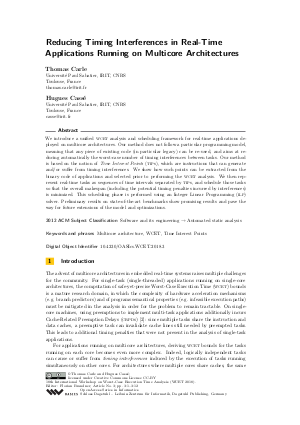Reducing Timing Interferences in Real-Time Applications Running on Multicore Architectures
Authors Thomas Carle, Hugues Cassé
-
Part of:
Volume:
18th International Workshop on Worst-Case Execution Time Analysis (WCET 2018)
Part of: Series: Open Access Series in Informatics (OASIcs)
Part of: Conference: Workshop on Worst-Case Execution Time Analysis (WCET) - License:
 Creative Commons Attribution 3.0 Unported license
Creative Commons Attribution 3.0 Unported license
- Publication Date: 2018-09-24
File

PDF
OASIcs.WCET.2018.3.pdf
- Filesize: 447 kB
- 12 pages
Document Identifiers
Subject Classification
ACM Subject Classification
- Software and its engineering → Automated static analysis
Keywords
- Multicore architecture
- WCET
- Time Interest Points
Metrics
- Access Statistics
-
Total Accesses (updated on a weekly basis)
0Document
0Metadata
Abstract
We introduce a unified wcet analysis and scheduling framework for real-time applications deployed on multicore architectures. Our method does not follow a particular programming model, meaning that any piece of existing code (in particular legacy) can be re-used, and aims at reducing automatically the worst-case number of timing interferences between tasks. Our method is based on the notion of Time Interest Points (tips), which are instructions that can generate and/or suffer from timing interferences. We show how such points can be extracted from the binary code of applications and selected prior to performing the wcet analysis. We then represent real-time tasks as sequences of time intervals separated by tips, and schedule those tasks so that the overall makespan (including the potential timing penalties incurred by interferences) is minimized. This scheduling phase is performed using an Integer Linear Programming (ilp) solver. Preliminary results on state-of-the-art benchmarks show promising results and pave the way for future extensions of the model and optimizations.
Cite As Get BibTex
Thomas Carle and Hugues Cassé. Reducing Timing Interferences in Real-Time Applications Running on Multicore Architectures. In 18th International Workshop on Worst-Case Execution Time Analysis (WCET 2018). Open Access Series in Informatics (OASIcs), Volume 63, pp. 3:1-3:12, Schloss Dagstuhl – Leibniz-Zentrum für Informatik (2018)
https://doi.org/10.4230/OASIcs.WCET.2018.3
BibTex
@InProceedings{carle_et_al:OASIcs.WCET.2018.3,
author = {Carle, Thomas and Cass\'{e}, Hugues},
title = {{Reducing Timing Interferences in Real-Time Applications Running on Multicore Architectures}},
booktitle = {18th International Workshop on Worst-Case Execution Time Analysis (WCET 2018)},
pages = {3:1--3:12},
series = {Open Access Series in Informatics (OASIcs)},
ISBN = {978-3-95977-073-6},
ISSN = {2190-6807},
year = {2018},
volume = {63},
editor = {Brandner, Florian},
publisher = {Schloss Dagstuhl -- Leibniz-Zentrum f{\"u}r Informatik},
address = {Dagstuhl, Germany},
URL = {https://drops.dagstuhl.de/entities/document/10.4230/OASIcs.WCET.2018.3},
URN = {urn:nbn:de:0030-drops-97493},
doi = {10.4230/OASIcs.WCET.2018.3},
annote = {Keywords: Multicore architecture, WCET, Time Interest Points}
}
Author Details
References
-
A. Abel, F. Benz, J. Doerfert, B. Dörr, S. Hahn, F. Haupenthal, M. Jacobs, A. H. Moin, J. Reineke, B. Schommer, and R. Wilhelm. Impact of resource sharing on performance and performance prediction: A survey. In CONCUR, 2013.

-
S. Altmeyer and C. Maiza Burguière. Cache-related preemption delay via useful cache blocks: Survey and redefinition. Journal of Systems Architecture, 2011.

-
S. Altmeyer, R. I. Davis, L. Soares Indrusiak, C. Maiza, V. Nélis, and J. Reineke. A generic and compositional framework for multicore response time analysis. In RTNS, 2015.

-
ARM. ARM Cortex-A Series - Programmer’s Guide for ARMv8 - A, v1.0 edition, 2015.

-
C. Ballabriga, H. Cassé, C. Rochange, and P. Sainrat. Otawa: An open toolbox for adaptive wcet analysis. In Software Technologies for Embedded and Ubiquitous Systems, 2010.

-
G. Durieu, M. Faugère, S. Girbal, D. Gracia Pérez, C. Pagetti, and W. Puffitsch. Predictable flight management system implementation on a multicore processor. In ERTS², 2014.

-
C. Ferdinand and R. Wilhelm. On predicting data cache behavior for real-time systems. Lecture notes in computer science, 1998.

-
J. Gustafsson, A. Betts, A. Ermedahl, and B. Lisper. The mälardalen WCET benchmarks: Past, present and future. In 10th International Workshop on Worst-Case Execution Time Analysis, WCET, 2010.

- IBM. Cplex user’s manual. https://www.ibm.com/support/knowledgecenter/SSSA5P_12.7.0/ilog.odms.studio.help/pdf/usrcplex.pdf, 2016.
-
Infineon. AURIX TC27x D-Step (32-Bit Single-Chip Microcontroller) User’s Manual, v2.2, 2014.

-
Y.-T. S. Li and S. Malik. Performance analysis of embedded software using implicit path enumeration. In Workshop on Languages, Compilers, and Tools for Real-Time Systems, 1995.

- C. Pagetti, J. Forget, F. Boniol, M. Cordovilla, and D. Lesens. Multi-task implementation of multi-periodic synchronous programs. Discrete Event Dynamic Systems, 21(3), 2011. URL: http://dx.doi.org/10.1007/s10626-011-0107-x.
-
R. Pellizzoni, E. Betti, S. Bak, G. Yao, J. Criswell, M. Caccamo, and R. Kegley. A predictable execution model for cots-based embedded systems. RTAS, 2011.

-
R. Pellizzoni, A. Schranzhofer, J.-J. Chen, M. Caccamo, and L. Thiele. Worst case delay analysis for memory interference in multicore systems. DATE, 2010.

-
B. Rouxel, S. Derrien, and I. Puaut. Tightening contention delays while scheduling parallel applications on multi-core architectures. ACM Trans. Embed. Comput. Syst., 2017.

-
A. Schranzhofer, J.-J. Chen, and L. Thiele. Timing analysis for tdma arbitration in resource sharing systems. RTAS, 2010.

